This post is part of Stand-In Central’s deep-dive series into the coronavirus pandemic as it relates to stand-in work in TV and film. For more posts in the long-running series, visit http://standincentral.com/coronavirus.
— The Editor
On March 27, 2020, the General Counsel for the National Labor Relations Board issued a memorandum to clarify unions’ and employers’ duties to bargain during an emergency.
What does this have to do with TV and film stand-ins?
There’s a COVID-19 pandemic raging in the United States right now.
And in labor law, employers usually can’t take unilateral actions. Most of the time, if they want to make changes in policies that affect union workers, they have to negotiate with the union before doing so.
To quote a famous case:
[L]abor law presumes that a matter which affects the terms and conditions of employment will be a subject of mandatory bargaining.
So the question is, under the TV/Theatrical Agreement under which many TV and film stand-ins work, will the AMPTP member-producers be allowed to create policies with respect to the COVID-19 pandemic that affect stand-ins, without first negotiating with SAG-AFTRA about those policies?
This recent memo helps answer that question.
Which means when you return to do stand-in work, this memo should be helpful should you find your employer requiring of you certain things related to COVID-19 that they didn’t negotiate with SAG-AFTRA beforehand.
So, let’s dig into the recent memo and its applicability to SAG-AFTRA stand-ins.
A Little Back Story
First, a little back story.
The National Labor Relations Act (NLRA) is the federal law that governs the behavior between employers and private-sectors unions, and more generally, between employers and private-sector workers.
The National Labor Relations Board (NLRB) is the governmental body that administers the NLRA.
The NLRB has a General Counsel.
Currently, Peter R. Robb is NLRB General Counsel.
Robb happens to be the nominee of SAG-AFTRA member Donald Trump — who, you know, is also the president of the United States.
Sidenote
I suppose you could also say Robb was the nominee of United States president Donald Trump — who, you know, is also a SAG-AFTRA member.
Pick one.
There is no insinuation here that Trump’s SAG-AFTRA membership, or Robb’s nomination by a SAG-AFTRA member, biases Robb for or against SAG-AFTRA. Instead, this mention is merely light shined on the relationships among the U.S. president, the NLRB GC, and SAG-AFTRA.
The Main Story
On March 27, 2020, amid the socio-cultural tumult the COVID-19 pandemic caused the United States economy, certainly there were questions about how the NLRA applied to employers in light of the emergency.
Under the NLRA, employers generally have to negotiate with unions when they want to take an action, rather than taking that action unilaterally.
But because of the unmatched emergency of the COVID-19 pandemic, the question many employers no doubt had was whether an employer can lawfully take certain unilateral actions in light of the pandemic emergency, or whether the employer still needs to bargain with the union before taking those actions.
In other words, employers were asking, does the pandemic give them some kind of lawful “pass” or “exemption” to make choices and take unilateral actions, and not consult or negotiate with unions about those choices or actions?
What the NLRB General Counsel Said
Robb’s memo, titled “Case Summaries Pertaining to the Duty to Bargain in Emergency Situations,” aimed to address the swirling questions.
Robb’s memo listed summaries of past NLRB cases to guide employers and unions on how the NLRB has ruled in the past on bargaining during emergencies.
Granted, Robb didn’t outright explain what the duty to bargain during this pandemic is. Rather, he showed what the NLRB has decided in the past, as guidance about how the NLRA could be applied to employers and unions with respect to bargaining obligations during the extant COVID-19 pandemic.
In Robb’s words:
I wish to make the public aware of several cases in which the Board considered the duty to bargain during emergencies. These include public emergencies as well as emergencies unique to a particular employer. Accordingly, the following case summaries are divided into those two categories. It is my hope that these summaries prove useful to those considering this issue during these challenging times.
As a footnote to this passage, Robb adds:
The case summaries herein are limited to the duty to bargain. This memorandum does not discuss other NLRA issues that may arise during the course of emergency situations.
Basically, he is clarifying this memorandum discusses only cases having to do with bargaining obligations during emergencies. His memorandum does not discuss questions of other obligations under the NLRA an employer may or may not have during emergencies. The implication is that in emergency situations, some of the NLRA law may be more wiggly, but his memo won’t be addressing that possible wiggliness.
The Relevant Cases
Robb’s memo generally lists cases wherein employers took unilateral actions that affected workers, without first negotiating with unions before taking those actions.
The two categories Robb divided past cases into were:
- Case Summaries Touching on Duty to Bargain During Public Emergency Situations
- Case Summaries Touching on the Duty to Bargain During Emergency Situations Particular to an Individual Employer
In short, he looked at cases when there were more-or-less major disasters (hurricanes, 9/11, and an ice storm), as well as cases where the emergency was something more related to the employer’s fundamental ability to conduct and sustain its business (log shortages and lacks of financial credit).
Sidenote
I suppose one might argue that Robb’s selection of cases in the memo and unique categorization of them could demonstrate some sort of selection bias, wherein he only selects certain cases that support certain objectives he might have during this time.
Alfred Korzybski of general semantics fame might caution a reader of Robb’s memo to be conscious of abstracting. To date, I have not read any insinuation that Robb’s case selection in the memo reflects a bias. However, as a layperson, I can’t say either way.
The Memo’s Relevance to the AMPTP and SAG-AFTRA
By my read, almost all of the cases Robb mentioned in his memory were not particularly relevant to the work of SAG-AFTRA stand-ins on AMPTP productions.
However, the last case Robb lists, Virginia Mason Hospital, 357 NLRB 564 (2011), struck me as quite relevant to future stand-in work on TV/Theatrical Agreement jobs. I say this because stand-ins arriving to work in the first days after or amid the COVID-19 pandemic may be presented with policies aimed to help prevent the spread of the novel coronavirus. And those policies may not have been negotiated with SAG-AFTRA beforehand.
Robb summarized the Virginia Mason Hospital case in this way:
Virginia Mason Hospital, 357 NLRB 564 (2011): The Board held that an employer violated Section 8(a)(5) by unilaterally implementing a flu-prevention policy without affording the Union notice and an opportunity to bargain. The employer was an acute care hospital in Seattle, with approximately 5,000 employees, approximately 600 of whom were registered nurses represented by the union. The employer unilaterally implemented a policy, during the term of the parties’ collective-bargaining agreement, requiring all nurses who had not received a flu immunization shot to either take antiviral medication or wear a protective mask. The ALJ held the employer to be excused from its bargaining obligation based on the test set forth in Peerless Publications, 283 NLRB 334 (1987), as: (1) the policy went directly to the employer’s core purpose: to protect patient’s health; (2) the policy was narrowly tailored to prevent the spread of influenza; and (3) the employer limited the requirement to nurses who refused to be immunized. The Board reversed, noting that the Board had, since the issuance of Peerless, sharply limited its applicability outside of its specific factual context. Thus, the employer in Peerless was a newspaper, and the unilaterally implemented policy in that case—a code of ethics—implicated the newspaper’s First Amendment rights. Therefore, the Board determined, that case “injected a constitutional element” into the analysis that was simply missing in the healthcare context. Member Hayes, dissenting, explained that he did not believe Peerless “has been—or should be—limited to its facts[,]” and that the Peerless test merely expressed in broad terms when an employer may unilaterally establish rules that are designed to protect the “core purpose of its enterprise.” In Member Hayes’ view, the employer’s flu-prevention policy satisfied this test for the reasons articulated by the ALJ.
Now, let’s analyze this a bit.
Unionized nurses working at Virginia Mason Hospital more or less showed up to work one day and the hospital unilaterally enacted a policy. That policy required nurses who had not gotten a flu shot either to wear a mask all day or take antiviral medicine.
The nurses’ union filed an unfair labor practice charge at the NLRB against the hospital because the hospital did not negotiate with the union before instituting this policy.
The NLRB took the case.
The case went before an administrative law judge (ALJ).
That judge exempted the hospital from the need to bargain with the union over this flu-prevention policy, based on a rationale presented in a prior NLRB case against employer Peerless Publications.
In the Peerless case, the rationale was that an employer was exempt from the need to bargain when the policy it tries to enact is related to the employer’s core purpose (such as newspaper publishing and maintaining editorial integrity); when the policy is also narrowly crafted expressly to serve that core purpose; and when the policy is also targeted only at affected workers.
Therefore, to the judge in Virginia Mason Hospital, the hospital was exempt from bargaining with the union over its unilaterally enacted flu-prevention policy for lawful reasons: because its flu-prevention policy went to the hospital’s core purpose of protecting the health of its patients, was narrowly targeted to just the spread of the flu, and only applied to a subset of nurses who had not gotten flu shots.
But the NLRB, which is higher than this case’s ALJ, reversed the ALJ’s opinion and found that Virginia Mason Hospital actually did have a duty to bargain with the union over its flu-prevention policy, and so it was not lawful for the hospital to unilaterally enact its flu-prevention policy.
The majority of the Board (i.e., just two Board members) explained that the hospital’s policy “plainly affected their working conditions” and that “work rules en-forceable through discipline are mandatory subjects of bargaining.” The majority also explained that the Peerless rationale for exemption was based on the facts of that specific case only, not for general application in other cases.
One member of the Board (i.e., the third of three total Board members) disagreed with the Board majority, though, insisting that the Peerless rationale for exemption should apply more generally and in Virginia Mason Hospital. In other words, this member of the Board agreed with the ALJ’s opinion, believing that the hospital enacted its flu-prevention policy for lawful reasons, which meant to this minority Board member that the hospital could take unilateral action in enacting this policy without union negotiation.
Why Virginia Mason Hospital Is Interesting
Virginia Mason Hospital is interesting for a number of reasons.
For one, it is clear that not all of the Board who ruled on this case agreed that the employer needed to negotiate with the union before enacting a policy that prevented the spread of the influenza virus to the patients in its care. One member of the three-member panel disagreed, believing that the employer could take this unilateral action, primarily because patient care was the employer’s core purpose as a hospital.
This is to say that with just a slightly different makeup of the Board, on COVID-19-related charges the NLRB could be siding with employers and supporting their unilateral actions during an emergency without the requirement of bargaining with unions first.
Robb’s memo might have been a means for hinting at the precariousness of NLRB sympathy for unions during emergencies by mentioning the dissenting opinion in his case summary. It’s hard for a layperson like me to say.
Also what’s interesting in Virginia Mason Hospital is that it may seem a bit outrageous to some that despite an emergency at a hospital, the NLRB decided the hospital still had to bargain with unions during an emergency. On its face, while this puts workers interests up front, it presumptively puts patient health at risk or in the back seat to worker or union interests. I don’t have an opinion on that, other than to say Virginia Mason Hospital is an extreme test for how the duty to bargain with unions presumptively must go, even during emergencies.
Why Virginia Mason Hospital Is Important for SAG-AFTRA Stand-Ins
For the reasons the NLRB ruling in Virginia Mason Hospital is interesting, it is also important for SAG-AFTRA stand-ins under the TV/Theatrical Agreement.
For one, while it may seem that the NLRB would require productions to negotiate with SAG-AFTRA before enacting, say, a COVID-19-prevention policy, if the makeup of the NLRB panel is different than it was in 2011, the NLRB might side with the production over the union.
Now, “patient health” is not a core purpose of a dramatic television series or feature films, so maybe there is not as much reason to fear a production trying to plea it has exemption from the duty to bargain with SAG-AFTRA during the pandemic over a COVID-19-prevention policy.
But who knows what productions’ lawyers could drum up to defend their unilateral actions after the start of this pandemic, especially if a production has long demonstrated an interest in worker safety and specifically actor safety. Perhaps lawyers would commingle the idea of safety with a production’s core mission and make it appear that, say, a television series’ core mission is to “safely produce television episodes” rather than simply “produce television episodes.”
But let’s look at practice, and how Virginia Mason Hospital might affect stand-ins when they show up to their next stand-in job.
For Example: Your First Stand-In Job after the Pandemic Started
Let’s say that you show up to work for the first time after the start of the COVID-19 pandemic.
Let’s also say work in TV and film has only started to come back, so it is in the early days of work after the industry work stoppage caused by the pandemic.
Stand-ins might find that casting directors are telling them that a production is requiring some kind of medical test to ensure you are healthy to work on the job the next day.
Some stand-ins might be okay with submitting to such a test. Some stand-ins might object to submitting to such a test. And some stand-ins may have a weird feeling about it, not sure what they’ll do when asked to submit to the test.
If Virginia Mason Hospital is any guide, then a production’s requirement as a condition of employment for you to submit to some kind of medical test to ensure you are healthy to work would be “a matter which affects the terms and conditions of employment.” As such, it is “a subject of mandatory bargaining” with SAG-AFTRA, and not a policy a production (or casting director) can unilaterally enact.
This goes for other policies not related to COVID-19, but herein we are speaking of the NLRB General Counsel’s memo on emergencies and the duty to bargain. As shown in Virginia Mason Hospital, the emergency of the COVID-19 pandemic may not free a production from the obligation to bargain with SAG-AFTRA about some kind of COVID-19-prevention policy if the production wants to enact one and enforce it upon SAG-AFTRA stand-ins.
The Upcoming Negotiations between the AMPTP and SAG-AFTRA
On June 30, 2020, the TV/Theatrical Agreement is set to expire. You can read it here and the updated version here.
Before June 30, the AMPTP and SAG-AFTRA are due to start negotiations for a successor agreement.
Will there be negotiated terms with respect to what productions can require of stand-ins related to the COVID-19 pandemic?
That’s a great question!
As Stand-In Central has already pointed out, SAG-AFTRA set its bargaining package all the way back in July 2019.
That was about five months before any evidence of COVID-19 afflicting people.
So there is no doubt that SAG-AFTRA’s bargaining package, unless somehow revised, had absolutely nothing to do with negotiating COVID-19-related policies that a production might try to enact.
This is not to exclude the possibility that the AMPTP might come to the bargaining table with some policy ideas it wants to negotiate with SAG-AFTRA about COVID-19.
This is just to say that because SAG-AFTRA set its bargaining package so early, it did not leave room in its package for events that might happen to SAG-AFTRA members subsequent to July 2019 — like the COVID-19 pandemic.
So What Can You Do?
If the AMPTP and SAG-AFTRA don’t negotiate policies with respect to the COVID-19 pandemic, and if a production, citing the pandemic or other emergency, makes requirements affecting your work terms and conditions as a stand-in, you may be able to object to the unilateral policy on the grounds that the production did not negotiate with the union in enacting the policy.
Keep in mind that if you object to a unilaterally imposed COVID-19-prevention policy, and if other stand-ins, union members, or co-workers criticize you for that objection, as you now know, the NLRB found in Virginia Mason Hospital that even a hospital in charge of critical care of patients had to bargain with the union over a flu-prevention policy, so it would not be unreasonable in the eyes of the NLRB to object to a unilaterally imposed COVID-19-prevention policy.
In such an event that you have to object to a pandemic-related policy when you are standing in, it would make some sense to notify SAG-AFTRA of the terms and conditions the production is trying to enact on you. A SAG-AFTRA business representative for the production might be a good place to start. Your notification might yield information from SAG-AFTRA that it actually did negotiate the terms the production is trying to enact related to COVID-19. Or, your notification might prompt SAG-AFTRA to start negotiating with the production about its COVID-19 policy.
Then again, if negotiation over COVID-19 terms doesn’t happen during the upcoming negotiations for the 2020 TV/Theatrical Agreement, one has to wonder whether SAG-AFTRA was interested at all in negotiating COVID-19 policies, and whether they’ll take up the charge even if you notify them of the issue.
An additional avenue for the so-affected stand-in would be to go straight to the NLRB with an unfair labor practice charge against the employer with a violation of Section 8(a)(5) for refusal to bargain with the union. Of course, that presupposes that the employer has refused to bargain with the union, and such a charge might better come from the union than from an employee.
Protect Yourself with Knowledge
As a sort of refrain, I chant to stand-ins: Know Your Contracts.
Your contracts are treasure chests of rights, privileges, money, and power negotiated for you by SAG-AFTRA that productions don’t automatically give you.
Sometimes you have to assert the rights contained in your collective bargaining agreement to get something from the production you’re working on.
(And sometimes you have to remind your union what the contracts actually say.)
Whether the AMPTP and SAG-AFTRA will negotiate contract language for 2020 around COVID-19 is still to be seen. But if it’s there, try to learn about it before you do your next stand-in job.
Also: Remember the General Counsel memo from March 27, 2020, and especially the case summary for Virginia Mason Hospital. They could come in handy the next time you do stand-in work — especially if production wants you to do something related to COVID-19 that you don’t necessarily find agreeable.
Thoughts? Comment below!

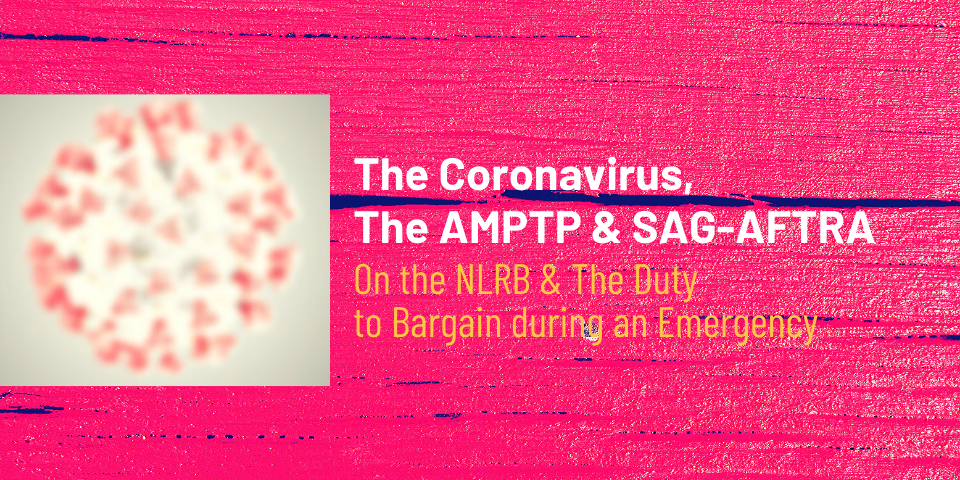
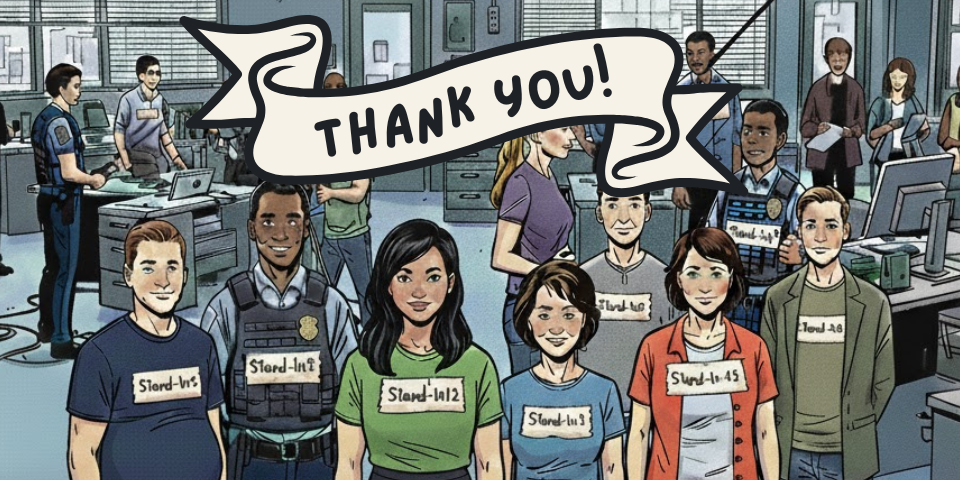
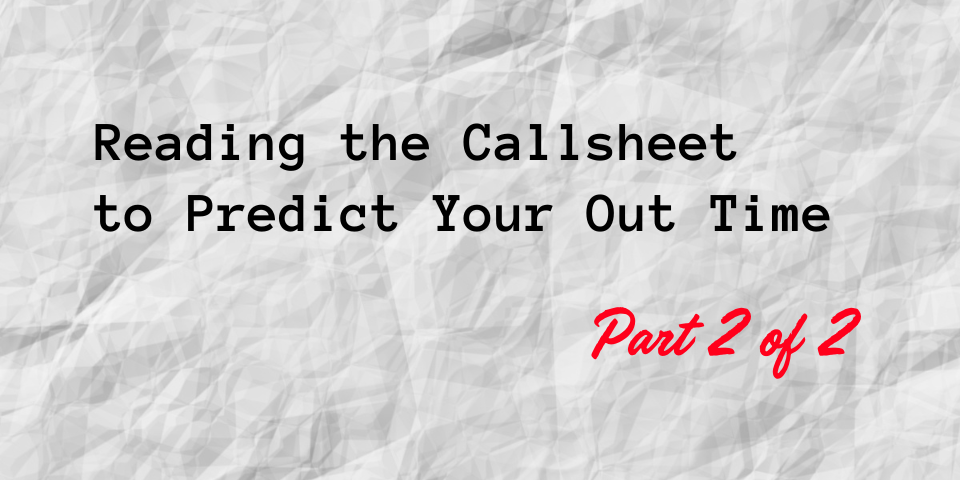
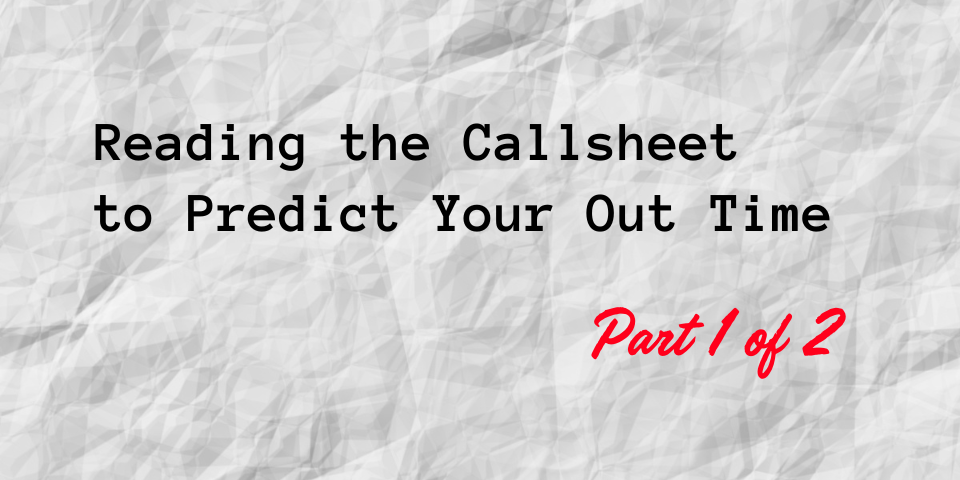
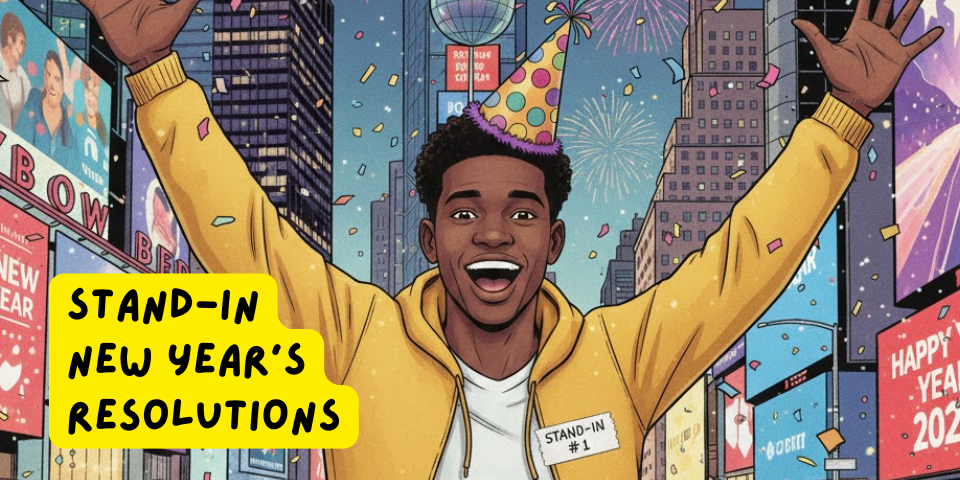
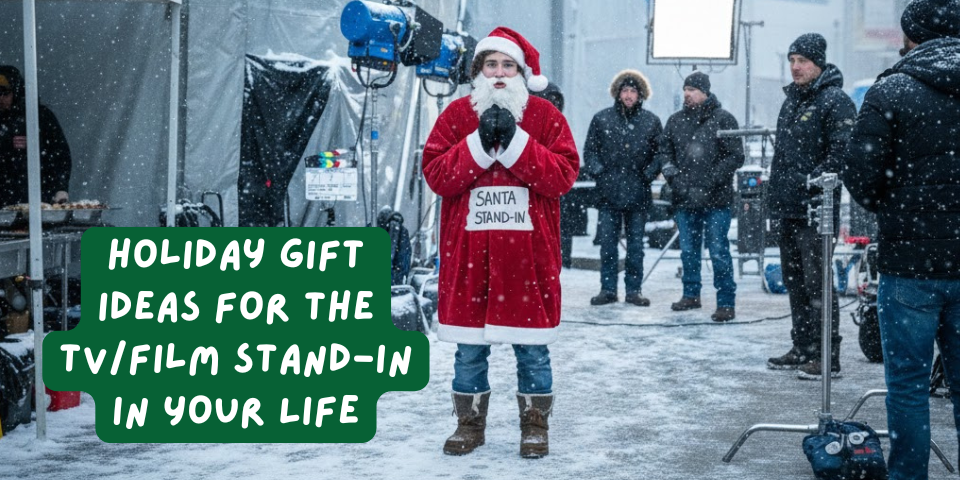
Hi Ben,
Sorry it’s taken me so long to get to this. I know you sent me the link many days ago. I think it’s really curious you are talking about nurses. I listened to a podcast with Michael Moore and workers rights activist Jane McAveley (twitter: @rsgexp). She mentions how certain professions are better suited to negotiate with employers, and nursing is one of them. Here is the podcast:
https://podcasts.google.com/?feed=aHR0cHM6Ly9hbmNob3IuZm0vcy8xMGZjOWEzMC9wb2RjYXN0L3Jzcw&episode=NjEzZThiODEtNmJlMy00ZTI0LTllYmQtMWEwMDA5Mjg3MjM2&ved=0CBoQzsICahcKEwigkfi8jIfpAhUAAAAAHQAAAAAQAg&hl=en